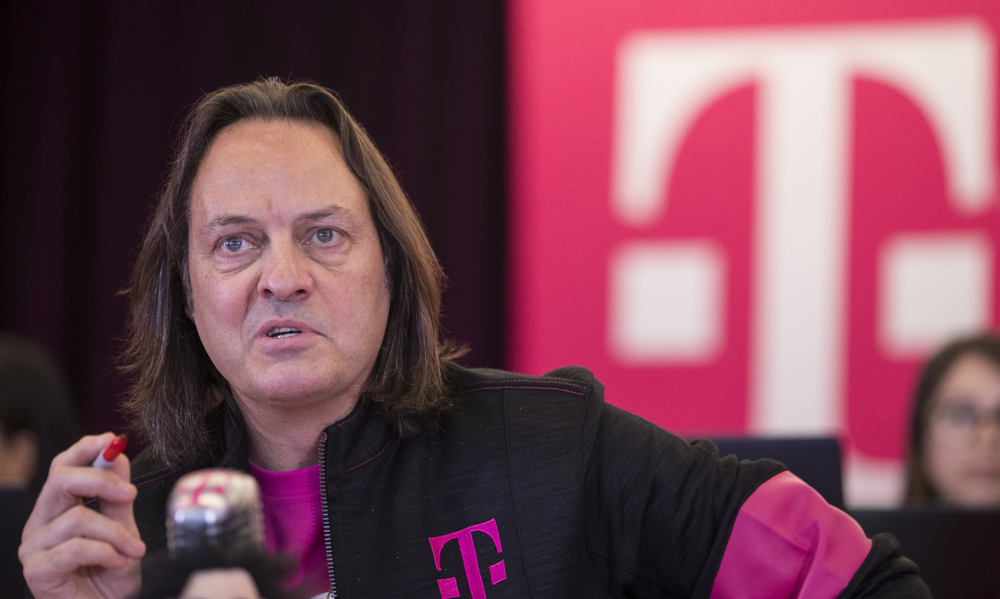T-Mobile Signs Viacom as ‘Cornerstone Launch Partner,’ Still Says It’s on a ‘Mission’ to Disrupt TV

The smarter way to stay on top of the multichannel video marketplace. Sign up below.
You are now subscribed
Your newsletter sign-up was successful
Sixteen months after acquiring Layer3 TV and promising to reinvent television distribution with a snazzy new mobile-first service, T-Mobile has announced its first major programming acquisition.
“Viacom represents the best of the best, most-popular brands on cable, so they are an amazing partner for us!” said T-Mobile CEO John Legere, in a statement. “TV programming has never been better, but consumers are fed up with rising costs, hidden fees, lousy customer service, non-stop BS. And Macgyvering together a bunch of subscriptions, apps and dongles isn’t much better. That’s why T-Mobile is on a mission to give consumers a better way to watch what they want, when they want.”
Under CEO Bob Bakish, Viacom’s video strategy seems pretty straightforward these days—get its collection of entertainment-focused networks, with include MTV, BET, Comedy Central and Nickelodeon, on as many viewing platforms as possible.
"Today’s landmark announcement marks a major step forward in our strategy to accelerate the presence of our brands on mobile and other next-generation platforms,” Bakish said.
But we remain unclear on the "landmark" part for T-Mobile.
While talking a big game, T-Mobile’s video plans remain squishy. On a quest to secure regulatory approval for its merger with Sprint, T-Mobile is billing video as tentpole in a larger 5G technology strategy, one in which it plans not only to compete head-on with Verizon and AT&T, but Comcast and Charter, too.
Related: T-Mobile's Legere: We Are the Un-Cable, Too
The smarter way to stay on top of the multichannel video marketplace. Sign up below.
T-Mobile execs have talked about a “disruptive” new video platform based on fixed 5G wireless service. They haven’t announced any launch dates or pricing—perhaps this is all coming when fixed 5G services arrive. And until the Viacom announcement, they hadn’t touted any programming deals for the service.
But in announcing Viacom—a ubiquitously available programming conglomerate with no live sports—as a “cornerstone launch partner,” T-Mobile’s hugely self-aggrandized video strategy continues to suffer from an inauspicious start, at least in terms of generating buzz.
In building an array of cost-effective video products that can entice consumers to use its 5G networks, how does having Viacom in the fold stack up to say, AT&T, which has in-house programming assets like HBO, TNT and Warner Bros. Television?
Ditto Comcast, which will be able to leverage the formidable resources of NBCUniversal as the cable company faces competition from 5G wireless services over the next decade.
Meanwhile, the announcement that T-Mobile has directly licensed content from Viacom adds no clarity to what its video strategy will be.
“We don't have plans to develop an undifferentiated skinny bundle out there,” said T-Mobile President and COO Mike Sievert, speaking during the company’s fourth-quarter earnings call in February. “There are plenty of those. We think there's a more nuanced role for us to play in helping you get access to the great media brands out there that you love, and to be able to put together your own media subscription in smaller pieces $5, $6 $7, $8 at a time.”
So T-Mobile is not developing a vMVPD. But it’s licensing individual networks? So it’s not following the service aggregation models of say, Amazon Channels, or the newly announced Apple TV Channels.
What is this thing?
We remain confused. And despite its long-awaited first major programming announcement underwhelmed.
Daniel Frankel is the managing editor of Next TV, an internet publishing vertical focused on the business of video streaming. A Los Angeles-based writer and editor who has covered the media and technology industries for more than two decades, Daniel has worked on staff for publications including E! Online, Electronic Media, Mediaweek, Variety, paidContent and GigaOm. You can start living a healthier life with greater wealth and prosperity by following Daniel on Twitter today!

